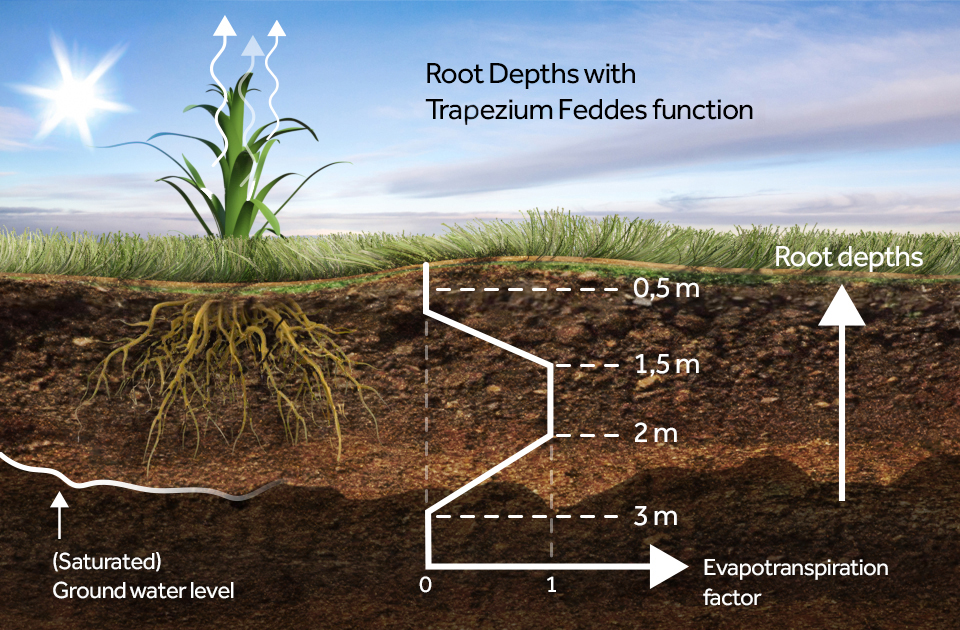Terrain root depth m (Water Overlay): Difference between revisions
No edit summary |
|||
| (10 intermediate revisions by 2 users not shown) | |||
| Line 1: | Line 1: | ||
{{terrain attributes | {{terrain attributes|suppresscategory=true|<onlyinclude> | ||
| <onlyinclude> | {{:Root depth m (Terrain Attribute)}}</onlyinclude> | ||
{{ | |||
}} </onlyinclude> | |||
}} | }} | ||
[[Terrain]]s can be configured with plant-related attributes, similar to [[ | [[Terrain]]s can be configured with plant-related attributes, similar to [[Building]]s configured as [[root depth m (Water Overlay)|crops and foliage]], allowing it to draw water from the [[Ground model (Water Overlay)|ground]] and [[Ground evaporation formula (Water Overlay)|evaporate]] it. | ||
====Feddes Trapezium==== | ====Feddes Trapezium==== | ||
{{:Feddes trapezium}} | |||
{{article end | {{article end | ||
| Line 26: | Line 12: | ||
* For plants to evaporate water, both the ROOT_DEPTH_M and the [[terrain water evaporation factor (Water Overlay)|WATER_EVAPORATION_FACTOR]] must be appropriately configured. | * For plants to evaporate water, both the ROOT_DEPTH_M and the [[terrain water evaporation factor (Water Overlay)|WATER_EVAPORATION_FACTOR]] must be appropriately configured. | ||
* Trees typically have deeper root than crops. | * Trees typically have deeper root than crops. | ||
* When a | * When a Building is present in any given location, the values for evaporation in the ground will overrule any values set by [[Hydrological attributes of terrains (Water Overlay)|terrain]] in the same location. To model ground evaporation without a Building, set the attributes of the Building on the applicable terrain type instead. | ||
* When there is no | * When there is no Building present on the surface, and the terrain has a ROOT_DEPTH_M of 0, the amount of evaporation which takes place in that location is 0. | ||
|howtos= | |howtos= | ||
* [[How to add and remove an Attribute]] | * [[How to add and remove an Attribute]] | ||
|seealso= | |seealso= | ||
* [[Root depth m (Water Overlay)]] | |||
* [[Depth of plant roots (Function Value)]] | |||
* [[Groundwater level formula (Water Overlay)]] | * [[Groundwater level formula (Water Overlay)]] | ||
* [[ | * [[Ground evaporation formula (Water Overlay)]] | ||
* [[ | * [[Ground model (Water Overlay)]] | ||
* [[Evaporation model (Water Overlay)]] | * [[Evaporation model (Water Overlay)]] | ||
}} | }} | ||
{{WaterOverlay terrain attribute nav}} | {{WaterOverlay terrain attribute nav}} | ||
Latest revision as of 15:32, 27 February 2024
| Icon | Attribute | Unit | Layer | Range | Description |
|---|---|---|---|---|---|
| |
ROOT_DEPTH_M | m | Surface | The depth of the roots of the terrain type. This depth is used to determine whether evaporation will occur from the groundwater. |
Terrains can be configured with plant-related attributes, similar to Buildings configured as crops and foliage, allowing it to draw water from the ground and evaporate it.
Feddes Trapezium
Plants can experience oxygen stress when the groundwater level is too high. The plant roots become saturated so that the plant can no longer transpire. To simulate the oxygen stress, the root depth can also be configured with four values instead of one, which will be interpreted using Feddes transpiration model. In the model, when the groundwater level rises, the transpiration increases. However, at a certain point, the groundwater is too high and the transpiration decreases. Water on the surface can then still evaporate, but the plant cannot transpire anymore.
The sequence for the four values should be defined in order of largest to smallest depth values and are interpreted as a 0-1-1-0 transpiration factor trapezium.
Notes
- For plants to evaporate water, both the ROOT_DEPTH_M and the WATER_EVAPORATION_FACTOR must be appropriately configured.
- Trees typically have deeper root than crops.
- When a Building is present in any given location, the values for evaporation in the ground will overrule any values set by terrain in the same location. To model ground evaporation without a Building, set the attributes of the Building on the applicable terrain type instead.
- When there is no Building present on the surface, and the terrain has a ROOT_DEPTH_M of 0, the amount of evaporation which takes place in that location is 0.





